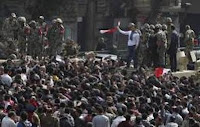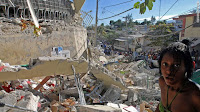At Last,Domino Effect Hits Muslim World

When President George W. Bush decided to invade Iraq, his vision-albeit a risky one- was to see create a stable democracy in the Middle East which would in turn put pressure on Iran and Saudi Arabia. Democracy in Iraq has been a mixed bag thus far but the signs are promising. However the winds of change in the North African Muslim world have been at light speed this week. Demonstrations in the streets of Tunisia, Yemen, Algeria and Egypt erupted this past week where protesters demanding that President Hosni Mubarek step down from power after 30 years. Mubarak has been a staunch ally of the United States during his reign-which has caused the US to turn a blind eye to human rights abuses. Quite often, our foreign policy choices involve a bad choice and worse choice. In foreign policy decisions, political stability often takes precedent over democratic rule-a very difficult and unfavorable sacrifice. This wave of change taking place in the Arab world presents a dilemma for US policy makers. What and who will replace the current regimes in Egypt, Yemen, Algeria and Tunisia?
In the case of Egypt, Mubarak was a bad choice with the worse choice being the Muslim brotherhood-A pro al Qaeda group with ties to the assassination of former Egyptian president Anwar Sadat. Mubarak has yet to step down from power however in what considered a short term compromise, he dismissed his entire cabinet. The first premise one needs to have in order to understand world affairs is that the world is a very bad place and often foreign policy choices aren't black or white. The US had to make nice with Stalin-a horrible brute-in order to defeat and even more horrible Adolph Hitler. We won't delude ourselves into thinking that Egypt will turn into Canada in terms of democratic rule, however let's hope that whoever succeeds the soon to be deposed leaders these will be less authoritarian and no less friendly to the US.



Comments